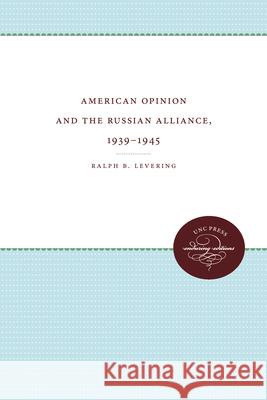American Opinion and the Russian Alliance, 1939-1945 » książka
American Opinion and the Russian Alliance, 1939-1945
ISBN-13: 9780807897089 / Angielski / Miękka / 2011 / 292 str.
In this analysis of the years of greatest American friendship with the Soviet Union, Levering comes to two conclusions. First, cosmopolitan, educated Americans of all classes were much more likely to change their negative attitudes of 1939 to positive ones by 1943 than were the provincial and poorly educated. Second, governmental leaders and the media, whether conservative or liberal, did not prepare the public for the probable realities of postwar international politics.
Originally published in 1976.
A UNC Press Enduring Edition -- UNC Press Enduring Editions use the latest in digital technology to make available again books from our distinguished backlist that were previously out of print. These editions are published unaltered from the original, and are presented in affordable paperback formats, bringing readers both historical and cultural value.
In this analysis of the years of greatest American friendship with the Soviet Union, Levering comes to two conclusions. First, cosmopolitan, educated Americans of all classes were much more likely to change their negative attitudes of 1939 to positive ones by 1943 than were the provincial and poorly educated. Second, governmental leaders and the media, whether conservative or liberal, did not prepare the public for the probable realities of postwar international politics.











